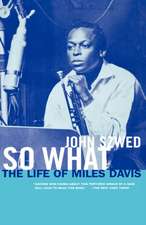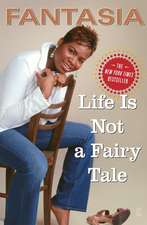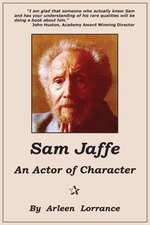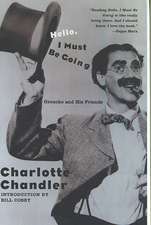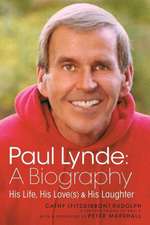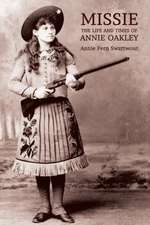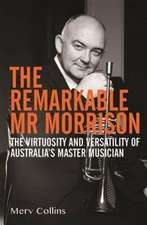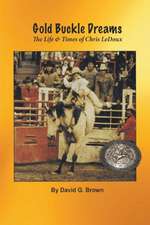From This Moment On
Autor Shania Twainen Limba Engleză Paperback – 10 mai 2012
Shania writes of being discovered, her time performing in Nashville and her sudden, dramatic rise to stardom. Shania will spare no details about her recent personal struggles and heartbreaks subjects about which she's never spoken publicly. This remarkable book is the story of a brave, honest, and genuine woman who faced odds and downfalls most people never experience, yet has succeeded beyond anyone's expectations.
Preț: 108.63 lei
Nou
Puncte Express: 163
Preț estimativ în valută:
20.79€ • 21.62$ • 17.16£
20.79€ • 21.62$ • 17.16£
Carte disponibilă
Livrare economică 24 martie-07 aprilie
Preluare comenzi: 021 569.72.76
Specificații
ISBN-13: 9781451620757
ISBN-10: 1451620756
Pagini: 448
Ilustrații: 2x16-pg 4-C insert
Dimensiuni: 140 x 214 x 36 mm
Greutate: 0.41 kg
Editura: Simon & Schuster
Colecția Atria Books
ISBN-10: 1451620756
Pagini: 448
Ilustrații: 2x16-pg 4-C insert
Dimensiuni: 140 x 214 x 36 mm
Greutate: 0.41 kg
Editura: Simon & Schuster
Colecția Atria Books
Notă biografică
Shania Twain rose to fame in the early 1990s with her debut album Shania Twain, and achieved worldwide success with her 1997 album Come On Over, which became the bestselling album of all time by a female musician, and the bestselling country album of all time. A five-time Grammy Award winner, Twain has also achieved major success as a songwriter, winning twenty-seven BMI Songwriter awards. She has sold more than seventy-five million albums worldwide to date, including forty-eight million in the United States.
Extras
Why Look Back?
I have to say, it’s been satisfying bringing myself up-to-date with myself, if you will, through writing this book. I can see now that I was missing out on some wonderful feelings and emotions from the memories of my youth as a result of closing the book too tightly behind myself—leaving the chapters to collect dust on a shelf so high above arm’s reach that it would take too much effort to reopen them down the road. Much to my relief, in some instances I can say there were things I thought would be a lot scarier than they actually were when revisiting them, and it surprised me how things seemed so much smaller in retrospect. It’s like the giant tree at the end of your grandparents’ driveway, which you thought only Jack from Jack and the Beanstalk could ever be brave enough to climb. But when you go back as an adult, that towering tree might now be dwarfed in comparison to the magnified lens you once saw it through as a tiny child.
Before I started writing, this pretty much summed up my attitude toward the past: “That was then; tomorrow’s another day.” I did that because some of my past was painful, and this outlook helped me stay afloat. Now I see that in closing off part of my past, I also missed what was happening to me in the present. I was always in a rush toward tomorrow. Sometimes addressing things openly at the time they happen prevents “getting stuck” later on.
I was unhappy. My life had been a fight for security, a place in the world, the chance to pursue my goals. From a very young age, I grew up with the mind-set of a survivor, like a boxer in the middle of the ring, constantly spinning and turning, ready to punch anyone coming at me. Life was not going to knock me down! I had to make it. So I didn’t let anyone close enough to find a weakness that could undermine me. I lived in this survivor mode into my adult years and through the ascent of my music career. Long after I’d achieved success and security, I still kept my dukes up, as if no one told me that the fight was over or that I was at least between rounds. It was exhausting living in this defensive state, and other than being tired of it, I also slowly began to feel more confident that life wasn’t necessarily trying to beat me up all the time.
The bell still sounds for my defensive survival mode now and then, but I practice not responding to it. I now find it more worthwhile trying to accept that my days will unfold as they will. That’s not to say I’ve become complacent. I’ve just redirected that strength to pursuing the fun stuff.
I also no longer sweat the discomfort of sharing the past, the present, or the voyage along the way. And I don’t see any point in keeping my story to myself, as explaining about life with my parents, for example, might inspire and give strength to many suffering men and women out there who can relate to and benefit from my parents’ challenges, and from the courage they displayed during some of the more difficult times. It would be a shame for their life’s experiences to have died along with them. Better to remember even their pain as a source of inspiration than to forget them in vain. My parents were conscientious people with good intentions. If they were alive today to reflect on the years when my brothers and sisters and I were growing up, they might not feel that they’d lived up to their good intentions. There were plenty of times when the Twain family didn’t have enough to eat, lacked warm clothes in the frigid Northern Ontario winters, and lived in a cramped, rented apartment or house with no heat. The perpetual undertow of financial instability took its toll in other ways, as it usually does, compromising my parents’ love for each other at times and no doubt feeding my mother’s recurrent bouts of depression.
Because of the unpredictable periods of instability in my childhood home, I didn’t feel that I could really rely on my parents to be consistent caregivers or protectors of me. I didn’t know what to count on from one day to the next—calm or chaos—and this made me anxious and insecure. It was hard to know what to expect, so it was easier to just be ready for anything, all the time. But I understand and forgive my parents completely for this because I know they did their best. All mothers and fathers have shortcomings, and although there were circumstances during my childhood that to some may seem extreme, if one could say my parents failed at times, I would say they did so honestly. They were often caught up in circumstances beyond their control. If my parents were here today, I’d tell them what a great job they did under the conditions. I would want them to feel good about how they raised me. I would thank them for showing me love and teaching me to never lose hope, to always remember that things could be worse and to be thankful for everything good in my life. Most important, they taught me to never forget to laugh. I thank them for always encouraging me to look on the bright side; it’s a gift that has carried me through many challenges. They may not always have been the best examples, or practiced what they preached, but it was clear they wanted better for us. That in itself was exemplary.
Ultimately, I am responsible for how I live my life now, and what I make out of it. In fact, I am actually grateful for what I’ve gone through and wouldn’t change a thing—although I admit I wouldn’t want to live it over again, either. Once was enough.
© 2011 Shania Twain
I have to say, it’s been satisfying bringing myself up-to-date with myself, if you will, through writing this book. I can see now that I was missing out on some wonderful feelings and emotions from the memories of my youth as a result of closing the book too tightly behind myself—leaving the chapters to collect dust on a shelf so high above arm’s reach that it would take too much effort to reopen them down the road. Much to my relief, in some instances I can say there were things I thought would be a lot scarier than they actually were when revisiting them, and it surprised me how things seemed so much smaller in retrospect. It’s like the giant tree at the end of your grandparents’ driveway, which you thought only Jack from Jack and the Beanstalk could ever be brave enough to climb. But when you go back as an adult, that towering tree might now be dwarfed in comparison to the magnified lens you once saw it through as a tiny child.
Before I started writing, this pretty much summed up my attitude toward the past: “That was then; tomorrow’s another day.” I did that because some of my past was painful, and this outlook helped me stay afloat. Now I see that in closing off part of my past, I also missed what was happening to me in the present. I was always in a rush toward tomorrow. Sometimes addressing things openly at the time they happen prevents “getting stuck” later on.
I was unhappy. My life had been a fight for security, a place in the world, the chance to pursue my goals. From a very young age, I grew up with the mind-set of a survivor, like a boxer in the middle of the ring, constantly spinning and turning, ready to punch anyone coming at me. Life was not going to knock me down! I had to make it. So I didn’t let anyone close enough to find a weakness that could undermine me. I lived in this survivor mode into my adult years and through the ascent of my music career. Long after I’d achieved success and security, I still kept my dukes up, as if no one told me that the fight was over or that I was at least between rounds. It was exhausting living in this defensive state, and other than being tired of it, I also slowly began to feel more confident that life wasn’t necessarily trying to beat me up all the time.
The bell still sounds for my defensive survival mode now and then, but I practice not responding to it. I now find it more worthwhile trying to accept that my days will unfold as they will. That’s not to say I’ve become complacent. I’ve just redirected that strength to pursuing the fun stuff.
I also no longer sweat the discomfort of sharing the past, the present, or the voyage along the way. And I don’t see any point in keeping my story to myself, as explaining about life with my parents, for example, might inspire and give strength to many suffering men and women out there who can relate to and benefit from my parents’ challenges, and from the courage they displayed during some of the more difficult times. It would be a shame for their life’s experiences to have died along with them. Better to remember even their pain as a source of inspiration than to forget them in vain. My parents were conscientious people with good intentions. If they were alive today to reflect on the years when my brothers and sisters and I were growing up, they might not feel that they’d lived up to their good intentions. There were plenty of times when the Twain family didn’t have enough to eat, lacked warm clothes in the frigid Northern Ontario winters, and lived in a cramped, rented apartment or house with no heat. The perpetual undertow of financial instability took its toll in other ways, as it usually does, compromising my parents’ love for each other at times and no doubt feeding my mother’s recurrent bouts of depression.
Because of the unpredictable periods of instability in my childhood home, I didn’t feel that I could really rely on my parents to be consistent caregivers or protectors of me. I didn’t know what to count on from one day to the next—calm or chaos—and this made me anxious and insecure. It was hard to know what to expect, so it was easier to just be ready for anything, all the time. But I understand and forgive my parents completely for this because I know they did their best. All mothers and fathers have shortcomings, and although there were circumstances during my childhood that to some may seem extreme, if one could say my parents failed at times, I would say they did so honestly. They were often caught up in circumstances beyond their control. If my parents were here today, I’d tell them what a great job they did under the conditions. I would want them to feel good about how they raised me. I would thank them for showing me love and teaching me to never lose hope, to always remember that things could be worse and to be thankful for everything good in my life. Most important, they taught me to never forget to laugh. I thank them for always encouraging me to look on the bright side; it’s a gift that has carried me through many challenges. They may not always have been the best examples, or practiced what they preached, but it was clear they wanted better for us. That in itself was exemplary.
Ultimately, I am responsible for how I live my life now, and what I make out of it. In fact, I am actually grateful for what I’ve gone through and wouldn’t change a thing—although I admit I wouldn’t want to live it over again, either. Once was enough.
© 2011 Shania Twain
Recenzii
“Packed with intimate details that may surprise even her most dedicated fans.” —EW.com
Descriere
From the award-winning country/pop star Shania Twain comes an in-depth look at her difficult childhood and rise to worldwide fame.



